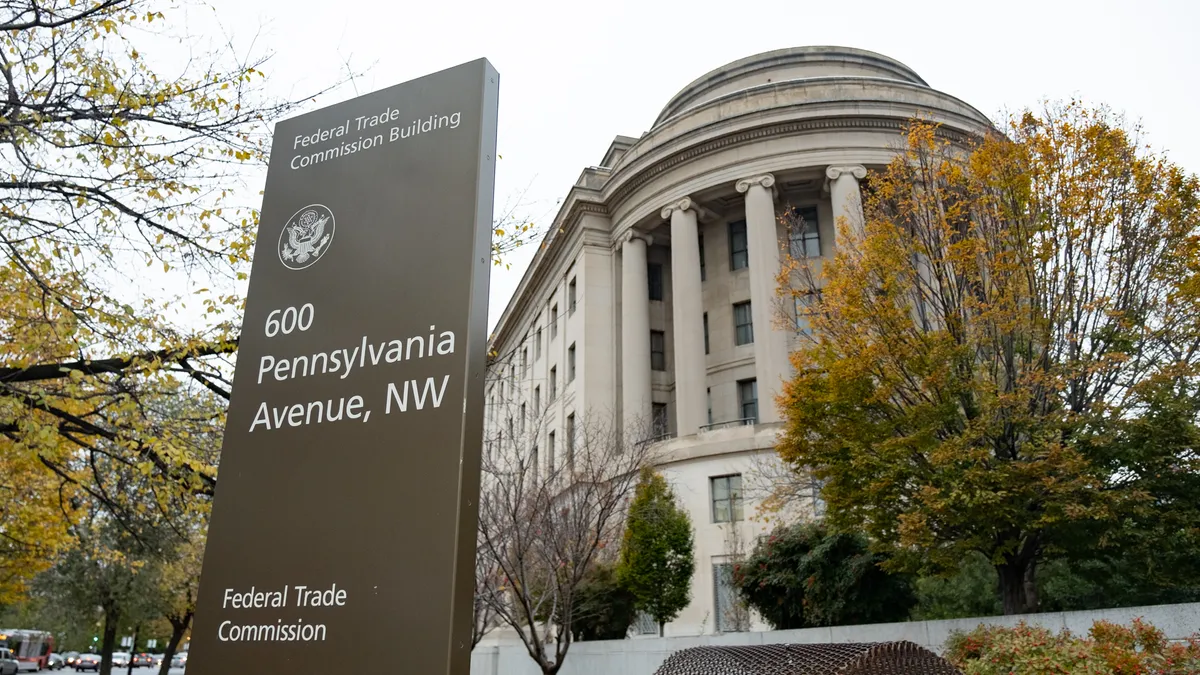Dive Brief:
- The Federal Trade Commission is challenging Amgen’s $27.8 billion acquisition of Horizon Therapeutics, announcing Tuesday a federal lawsuit that claims Amgen will use its market position to guard the monopolies of two Horizon drugs.
- The FTC argues Amgen will offer attractive rebates on medicines like Enbrel and Otezla to persuade insurers to give favored position for Horizon’s drugs Tepezza and Krystexxa. The value of this “bundling,” the FTC said, “may make it difficult, if not impossible, for smaller rivals who are developing drugs to compete against Tepezza and Krystexxa to match the level of rebates that Amgen would be able to offer.”
- Horizon shares fell by more than 15% in Tuesday morning trading. News of the lawsuit also sank shares in other companies that recently agreed to buyout deals. Seagen, which received a $43 billion bid from Pfizer, fell as much as 6%, while Prometheus Biosciences, the target of a $10.8 billion buyout from Merck, initially fell 2%.
Dive Insight:
The FTC has signaled it wants to take a broader view of how consumers might be harmed by pharmaceutical mergers. Tuesday’s action was the first sign the agency is following through.
By invoking the breadth of Amgen’s current business, the FTC is taking a different approach than its usual practice. Typically, the objections raised by the agency to biopharma deals involve specific product or market overlaps, which companies can resolve by divesting assets. For example, Celgene sold Otezla to Amgen ahead of the former company’s acquisition by Bristol Myers Squibb, while Allergan sold off an experimental drug before being absorbed into AbbVie.
The FTC’s new argument — which the agency officials and outside experts discussed at a meeting last year — is that “cross-market bundling” activities can inhibit competition and raise prices for consumers.
“Amgen has a history of leveraging its broad portfolio of blockbuster drugs to gain advantages over potential rivals,” the FTC said in its statement. “In particular, the company has engaged in cross-market bundling, which involves conditioning rebates (or offering incremental rebates) on products such as Enbrel in exchange for giving Amgen drugs preferred placement on the insurers’ and PBMs’ lists of covered medications in different product markets.”
The vote in favor of suing to block the deal was 3-0, although the commission currently lacks any Republican members.
In a statement Tuesday, Amgen denied the FTC’s claims, and expressed confidence that it could successfully complete the deal.
“The FTC’s claim that Amgen might ‘bundle’ these medicines (offer a multi-product discount) at some point in the future is entirely speculative and does not reflect the real world competitive dynamics behind providing rare-disease medicines to patients,” Amgen said. “And we committed that we would not bundle the Horizon products raised as issues; however, the commission still decided to pursue this path.”
Wall Street analysts were skeptical the FTC’s arguments could win in courts. “We question whether the FTC would have substantial evidence that the transaction would actually be anti-competitive, particularly since rebating/bundling is uncommon for orphan disease drugs,” SVB Securities analyst David Risinger wrote in a note to clients.
Still, the FTC’s announcement spurred speculation the agency might choose to challenge Pfizer’s buyout of Seagen, too.
“The lens through which FTC appears to be viewing the prospects of [Amgen-Horizon] would suggest the ~$12B of oncology revenue recognized by [Pfizer] in [2022] likely poses more of an ‘anticompetitive’ concern” than any individual product overlaps, Stifel analyst Stephen Willey wrote in a note to clients.
If the FTC begins to challenge more pharma mergers, it could disrupt the common cycle of acquisitions that feeds large drugmakers’ pipelines, while giving investors in smaller companies the capital to reinvest in biotech startups, analysts said.
“If allowed to stand, we think this new approach is likely to cast a lasting pall over the sector for some time to come,” Piper Sandler analyst Christopher Raymond wrote.












